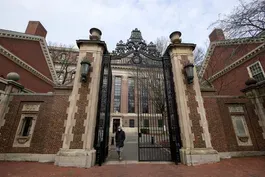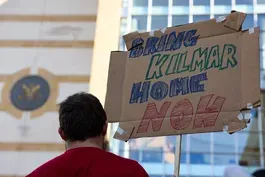
How college communities are reacting to funding threats
Clip: 4/15/2025 | 5m 34sVideo has Closed Captions
How college communities are reacting to funding threats, international student arrests
Recent threats to federal funding and arrests of international students have created a sense of unease on many college campuses. A trio of editors at student newspapers across the country share a unique perspective about what they are seeing on the ground and how campus communities are reacting.
Problems with Closed Captions? Closed Captioning Feedback
Problems with Closed Captions? Closed Captioning Feedback
Major corporate funding for the PBS News Hour is provided by BDO, BNSF, Consumer Cellular, American Cruise Lines, and Raymond James. Funding for the PBS NewsHour Weekend is provided by...

How college communities are reacting to funding threats
Clip: 4/15/2025 | 5m 34sVideo has Closed Captions
Recent threats to federal funding and arrests of international students have created a sense of unease on many college campuses. A trio of editors at student newspapers across the country share a unique perspective about what they are seeing on the ground and how campus communities are reacting.
Problems with Closed Captions? Closed Captioning Feedback
How to Watch PBS News Hour
PBS News Hour is available to stream on pbs.org and the free PBS App, available on iPhone, Apple TV, Android TV, Android smartphones, Amazon Fire TV, Amazon Fire Tablet, Roku, Samsung Smart TV, and Vizio.
Providing Support for PBS.org
Learn Moreabout PBS online sponsorshipWILLIAM BRANGHAM: So to get a different look at the unease at colleges and universities right now, both from the threats to federal funding, as well as the arrests of international students, we spoke to a trio of editors at student newspapers about what they're seeing and how campus communities are reacting.
MAVEN NAVARRO, "The Crimson White": I just feel like it's instance after instance that national news outlets are paying attention to things going on college campuses.
SHEA VANCE, "Columbia Daily Spectator": It is an incredibly unique time to be a member of the Columbia community.
ZHANE YAMIN, "The Michigan Daily": When DEI was cut, I think then it really kind of hit home for a lot of people and it felt like, OK, this thing is real, this thing is here and this thing is affecting us.
My name is Zhane Yamin.
I am a junior at the University of Michigan and I'm one of the co-editors and chief of "The Michigan Daily."
MAVEN NAVARRO: My name is Maven Navarro.
I am a junior.
I attend the University of Alabama and I'm the editor in chief of "The Crimson White."
SHEA VANCE: My name is Shea Vance.
I am a junior at Barnard College of Columbia University and I'm the editor in chief of "The Columbia Daily Spectator."
The news coming out of Columbia is so frequent and also so deeply impactful for so many people.
A lot of people are raising concerns about the state of academic freedom at Columbia and what many people are identifying as an acquiescence to the Trump administration's demands.
A lot of people are worried about their visas potentially getting revoked or even Mahmoud Khalil, who is here on a green card, was detained.
So I do think it is having its impact on people's daily lives.
It's definitely a main topic of conversation right now at Columbia, the federal funding cuts, the ICE activity around campus, and the scrutiny that's been facing our campus.
MAVEN NAVARRO: We have had a lot of protests on campus.
There's been a lot of discourse going on between students, so kind of chaotic, to be honest.
I would say maybe like 50/50 Republican and Democrat divide on campus.
I kind of see it on both extremes.
So I do see people that did vote for President Trump that are kind of starting to regret their vote, especially with the tariffs going on now.
There's a lot of students that do say things like, oh, well, I didn't know that this would happen.
I didn't know it would actually be like this.
There are students that didn't vote for him that are kind of continuing the, I told you so, that this was going to happen and are frustrated with the people that might have voted for him.
And then you have the people that did vote for Trump and do not regret their vote.
They're glad that he is doing the things that he said he was going to do.
ZHANE YAMIN: When we broke the news that the University of Michigan was announcing cuts to DEI, we haven't seen such a large influx of op-eds and letters to the editor about one specific topic since October 7.
I think a lot of people aren't angry necessarily that the programs themselves were cut, but more so that the university is sort of capitulating or aligning itself with the Trump administration and its broader initiatives and its broader goals.
So I think one thing that's been key in covering this thing has been finding all of these perspectives and finding the perspectives to sort of illuminate the breadth of opinions.
SHEA VANCE: There's definitely been a chilling effect, I would say.
Protests are still happening.
They're getting smaller.
Even if they're not less willing to be going to protest, people are less willing to be identifying themselves at protests.
Our reporters are as aware as anybody about what the risks are right now.
I think that student newsrooms have a right to be a bit concerned about the ability to report on campus and the ability to do so completely safely.
MAVEN NAVARRO: My job is to tell the truth and to share the truth.
And so sometimes that has been challenging as well this year.
Students and the community have not always been super welcoming of things going on.
And even if it's not our fault, I mean, we're the messengers of it.
And we are sharing what is going on in the world.
And so sometimes we do kind of take the brunt of their frustrations, instead of the thing that we are reporting on.
ZHANE YAMIN: People have come to us and they have asked, like, hey, can I be anonymous?
I'm an international student.
I know I said this and I do believe it, but I'm uncomfortable because my safety, my physical safety, I might be harmed if this is up.
Those have been conversations of that our organization, "The Michigan Daily," has been having and will continue to have with people as it comes up.
When you think about what it means to be a college student now, I think it is sort of being altered.
Like, what is your relationship between the administration and how much do you trust it and how much do you trust it to look out for you and how much do you take it upon yourself to look out for yourself?
SHEA VANCE: The past few years have really eroded the trust between Columbia's administration and Columbia's student body.
And that's for a variety of reasons.
There's a lot of consensus that there is lacking communication and transparency.
This transparency issue also impacts student press.
Student journalists at Columbia, just like student journalists at any university, have a real stake in their institution.
And we very openly want what's best for our community, because we're members of this community and we know our campus better than any other journalist.
And so we tend to approach stories with more care, with more attention to detail, with more attention to the truth, with more nuance, definitely.
And that impacts everything we do.
And it certainly impacted the coverage that we have done over the past couple of years.
China cuts exports of rare earth minerals amid trade war
Video has Closed Captions
Clip: 4/15/2025 | 7m 37s | China cuts exports of vital rare earth minerals as trade war with U.S. intensifies (7m 37s)
Grants frozen as Harvard pushes back against Trump's demands
Video has Closed Captions
Clip: 4/15/2025 | 6m 41s | Billions in grants frozen after Harvard pushes back against Trump's demands (6m 41s)
Inside the camp where Sudanese refugees have fled civil war
Video has Closed Captions
Clip: 4/15/2025 | 9m 57s | Inside the crowded camp where Sudanese refugees have fled violence and hunger (9m 57s)
Judge presses DOJ on wrongfully deported man
Video has Closed Captions
Clip: 4/15/2025 | 8m 54s | Judge presses Trump administration on why it hasn't returned wrongfully deported man (8m 54s)
News Wrap: Iran leader downplays chance of nuclear deal
Video has Closed Captions
Clip: 4/15/2025 | 4m 58s | News Wrap: Iran's supreme leader downplays chance of deal from nuclear talks with U.S. (4m 58s)
Why abortions are rising in U.S. despite more restrictions
Video has Closed Captions
Clip: 4/15/2025 | 7m 11s | Why abortions are rising in the U.S. despite more restrictions (7m 11s)
Providing Support for PBS.org
Learn Moreabout PBS online sponsorshipSupport for PBS provided by:
Major corporate funding for the PBS News Hour is provided by BDO, BNSF, Consumer Cellular, American Cruise Lines, and Raymond James. Funding for the PBS NewsHour Weekend is provided by...
















